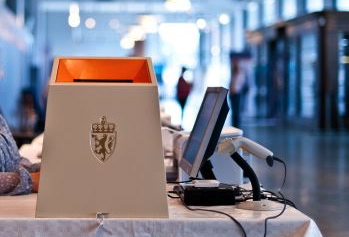NEWS ANALYSIS: As Norwegian voters cast their ballots on Monday, they were reminded of just how privileged they are, no matter which side prevails in their national election. Both of the main prime minister candidates are generally well-regarded, have crisis management skills and are backed by one of the strongest national economies in the world.

“While politicians quarrel, or online warriors belch out doomday prophecies, it’s easy to forget that we actually have lived in the world’s best country under both Jens Stoltenberg (former Labour Party leader, now head of NATO) and Erna Solberg (the Conservatives incumbent prime minister),” wrote Eirik Hoff Lysholm, leader of the Norwegian Editors’ Association, in his own newspaper, Dagsavisen, “and we will surely do the same under Jonas Gahr Støre (the current Labour Party leader), if it goes the way polls indicate.”
Neither Labour- nor Conservative party leaders want to admit it, but the two parties actually agree on many issues. Both support active foreign policy and international cooperation, NATO membership and a strong welfare state. Both have also supported EU membership in the past, but that issue has been tucked away because of still-low public support.
Both also have no intention of halting either oil exploration or production, in an unusual joint defiance of UN pleas to limit both. Both claim Norway will still meet its climate goals, although they differ somewhat on how to do that while still pumping up North Sea crude. Despite strong opposition to ongoing exploration from several smaller parties, Norway’s two “steering” parties still appear large enough to block calls for an end to oil exploration, especially when Labour is backed by its prospective pro-oil Center Party partner in a new coalition, and when the Conservatives can expect support from its former government partner, the even more conservative Progress Party.
The bottom line is that Norwegian voters, who typically turn out in large numbers, know that there rarely are any major changes in their society after an election. There’s lots of political hype on both sides about change, but the good life in Norway can generally be expected to continue. As Lysholm wrote, “the vast majority of Norwegians have a good life regardless of who runs the country. We of course have people who aren’t as fortunate as others, but those who are doing well make up a larger portion of the population in Norway than in any country.”

Perhaps that explains why any Norwegians are so politically engaged, why fully nine political parties are poised to win full representation in Parliament and why hundreds of thousands settled down in front of their TVs to follow the many party leader debates held during the country’s relatively short official campaign season (six weeks, from late July until the second Monday in September).
Kjetil B Alstadheim, political editor of newspaper Aftenposten, also recently noted that despite all the issues debated in a series of party leader debates over the past few weeks, the single most important asset any government has is the ability to steer its nation through the next crisis. And one will come. Prime Minister Solberg has won widespread praise for her handling of the Corona crisis, and she also emerged well from the oil price collapse in 2014 and the refugee crisis in 2015, when more than 30,000 people needing help suddenly showed up in the country. Støre, a former foreign minister who survived a bomb attack in Kabul during his term in office, also had to help Stoltenberg tackle the world’s worst mass-murder ever when, in 2011, an extremist right-wing terrorist bombed their government’s headquarters and then set off a massacre at a Labour Party youth camp.
Both sides have thus proven themselves capable of leading in crisis. Both can also enjoy generally widespread public confidence, a solid health care system, highly advanced digitalization and a national economy that many other world leaders envy. The climate crisis, meanwhile, is putting them to the test. Both are acutely aware that the economy is built on oil that’s becoming more unpopular by the day, but both claim oil will still be needed for years to come and that Norwegian production generates relatively low emissions. Newly proposed carbon- and oil tax policy, meanwhile, is expected to curb or eventually end exploration by removing incentives for drilling.
Norwegian politicians have long tended to get along with one another across party lines. There’s been growing concern over harassment and even hatred expressed in social media, often by people too cowardly to identify themselves, but the politicians rarely harass one another.
Local media, meanwhile, have kept election interest high with one public opinion poll after another. It led to what commentators called a “political thriller” as support for some parties like Center took a dive while other smaller parters gained. Støre himself has said he thinks there are too many polls, “disturbing the campaign” and diverting interest from issues to the race itself. It remained open on Monday but weighted towards some form of a left-center victory. Støre may end up with a minority government with support agreements from other parties, just like Solberg during much of her two terms.
Lines were long during early voting last week, as Norwegians performed their civic duty even before Election Day itself. Fully 42 percent had already voted by the time election booths opened Monday morning, meaning that election results may come earlier than usual after polls close at 9pm. Then negotiations among parties will begin to form a new government. They’re expected to be fairly civil as well, but may take more time than usual given all the players involved.
newsinenglish.no/Nina Berglund

